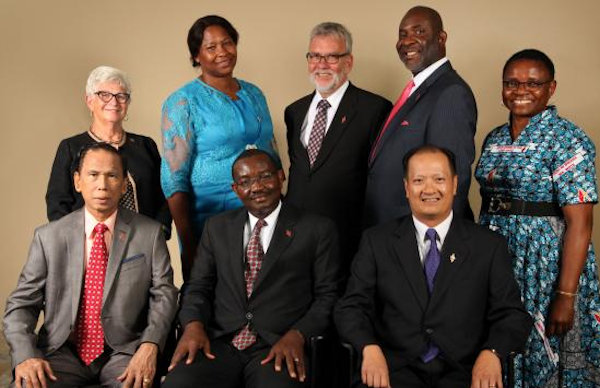The Church’s top court will review 11 items, most focused on issues of human sexuality, when they meet Oct. 25-28.
LINDA BLOOM
United Methodist News Service
A controversial decision by United Methodists in New York last June to commission and ordain openly gay clergy candidates is one of the 11 items on the agenda of the denomination’s top court this month.
The fall meeting of the United Methodist Judicial Council will take place Oct. 25-28 at the Hyatt Regency Hotel in Lisle, Ill., in the Chicago area. Oral hearings are scheduled on two docket items.
This is the first deliberative session of the 2016-2020 Judicial Council, which includes five new members elected in May during General Conference 2016 in Portland, Oregon.
The council will review two separate cases — from New York and Northern Illinois — regarding a bishop’s decision of law over whether the conference board of ordained ministry “is required to ascertain whether a candidate meets the qualifications for candidacy and ordained ministry, including whether or not she or he is exhibiting ‘fidelity in marriage and celibacy in singleness’ or is a ‘self-avowed practicing homosexual.’
The United Methodist Book of Discipline has long stated that all individuals are of sacred worth but the practice of homosexuality “is incompatible with Christian teaching.”
In the New York case, the request for a ruling from Bishop Jane Allen Middleton, submitted by Steven M. Knutsen, also asked whether the board of ordained ministry can legally recommend candidates that its members believe to be fit those descriptions.
He asked whether such candidates are even eligible to be candidates for any stages of the ordination process or for appointment as a United Methodist clergy member. He also questioned whether a bishop commissioning and/or ordaining are ineligible candidate is “a valid act of ministry.”
In her decision of law, Middleton wrote that it would be “improper” for a bishop to make a decision related to the authority “reserved to other organizations, bodies and divisions in the Constitution.” She also found questions relating to a candidate’s eligibility to be “hypothetical” in the absence of specific facts and ruled them out of order.
In Northern Illinois, the Rev. Scott Field’s request for a bishop’s decision of law about what the board of ordained ministry is required to do also asked whether the board can “legally recommend to the clergy session a candidate whom they believe to be in violation of the fidelity, celibacy, or definition of marriage standard.”
Bishop Sally Dyck ruled both requests “moot and hypothetical.” A motion made by Field on the first question, while discussed in the clergy session, was defeated, she wrote, so no action had occurred to warrant a decision of law.
Because “no one knows for sure” if the board recommended candidates “who have a sexual identity, behavior, history or belief in violation of the stated disciplinary paragraphs,” the second question also was hypothetical, the bishop said. She pointed out that Field did not make a request for a declaratory decision, which would need a two-thirds recommendation of the annual conference/clergy session.
Another docket item involves a decision of law by Bishop Sudarshana Devadhar regarding a resolution passed by the 2016 New England Annual Conference. He ruled that parts of the resolution, “Action of Non-Conformity With the General Conference of The United Methodist Church,” violate church law.
Oral hearings
The council’s meeting begins Oct. 25 with two oral hearings, which are open to the public.
The first hearing, at 8:30 a.m., is an appeal by the Rev. Errol Leslie of the decision of the Southeastern Jurisdictional Committee on Appeals upholding a decision related to his Jan. 11-12, 2016, church trial by the Florida Annual Conference.
The trial court found Leslie guilty of charges of sexual misconduct, immorality and disobedience to the order and discipline of The United Methodist Church and terminated his clergy membership in the New England Annual Conference.
In a related docket item, Judicial Council is asked to review of a subsequent decision by Devadhar of the New England Conference that the Book of Discipline supports the right of the Florida trial court to revoke membership in a different conference.
At 10:30 a.m., a second oral hearing will focus on a request by the Texas Annual Conference for a declaratory decision on matters relating to the final disposition of a penalty for a church trial in 2012. The conference membership of the Rev. Carla Badgett was later terminated as a result of the trial.
In a related docket item, Judicial Council is asked to review a decision by Bishop Janice Riggle Huie that a question about fair process rights related to the Badgett situation was an “improper request” because the episcopacy lacks the authority to make substantive rulings on fair process, judicial process or administrative process.
Last Updated on December 8, 2023

